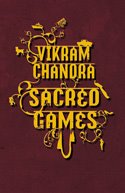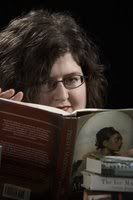 2006 has been a year of scandals for the publishing industry. In January, James Frey’s bestselling memoir A Million Little Pieces was exposed as fiction by The Smoking Gun, to the utter embarrassment of one of the author’s biggest fans, Oprah Winfrey.
2006 has been a year of scandals for the publishing industry. In January, James Frey’s bestselling memoir A Million Little Pieces was exposed as fiction by The Smoking Gun, to the utter embarrassment of one of the author’s biggest fans, Oprah Winfrey. Michael Baigent and Richard Leigh, authors of The Holy Blood and the Holy Grail, took Random House and Dan Brown, author of The Da Vinci Code, to court for breach of copyright. Baigent and Leigh claim that Brown “stole the whole "architecture" of their non-fiction work.”
A few months later Kaavya Viswanathan was exposed as a plagiarist. The Harvard student, whose heavily promoted novel How Opal Mehta Got Kissed, Got Wild, and Got a Life has since been recalled by Little, Brown & Co., was accused of flagrantly copying the works of authors Megan F. McCafferty, Salman Rushdie, and Sophie Kinsella, with over 40 specific instances now cited.
So after all this excitement, what should readers expect in the remaining months of 2006? The fall is generally when most publishers release their “big guns,” the titles they expect to lead sales in the lucrative Christmas sales rush. With so many new releases on the horizon, how does a reader determine what to read?
If you survey the litblogs, most seem to be eagerly waiting for St. Lucy’s Home for Girls Raised by Wolves by Karen Russell, a collection of short stories (Knopf, September) and The 9/11 Report: A Graphic Adaptation by Sid Jacobson and Ernie Colón (Hill and Wang, September). If you go by the trade publications, the focus seems to be on the lead nonfiction titles, such as Breach of Faith: Hurricane Katrina and the Near Death of a Great American City by Jed Horne (Random House, July) or Palestine: Peace not Apartheid by Jimmy Carter (Simon & Schuster, October).
2006 may not see a blockbuster title release on the magnitude of a Harry Potter or The Da Vinci Code; however, a wide range of great and exciting titles continue to be published each month. Interesting experimental and “literary” fiction continues to be offered, often from smaller publishers. With the rise in litblogs and the ease of online book purchases, readers have access to a much broader range of titles than ever before.
After attending BookExpo Canada (the annual book publishing trade show) earlier this year, I believe that reports of books being “doomed” are grossly exaggerated. Publishing may change but readers will always want books. With that in mind, here are some of the titles I believe will catch some “buzz” in the coming months.
Fiction
Giraffe by J.M. Ledgard (Penguin Books, August). J.M. Ledgard is a foreign correspondent for the Economist. Giraffe, a debut novel, is based on the true story of the massacre of the largest herd of giraffes ever in captivity.
The Emperor’s Children by Claire Messud (Knopf, August). A comedy of manners in a post-September 11th New York City, from a masterful observer of human nature.
Only Revolutions: A Novel by Mark Z. Danielewski (Pantheon, September). Danielewski, author of the cult hit, experimental horror novel House of Leaves, has taken his experiments in literature in this story about teenage lovers. Printed on two sides, readers hear the story from Hailey's point of view, flip it over and get Sam's.
St. Lucy’s Home for Girls Raised by Wolves by Karen Russell (Knopf, September). A debut collection of ten short stories on the perils and pains of growing up in a dysfunctional home, from an author many are heralding as the next great voice of American literature.
The Interpretation of Murder: A Novel by Jed Rubenfeld (Henry Holt, September). A historical thriller featuring Sigmund Freud inspired by his one visit to New York City in 1909. Freud is drawn into the mind of a sadistic killer who is savagely attacking Manhattan’s wealthiest heiresses.
The Thirteenth Tale by Diane Setterfield (Atria, September). In this tribute to gothic novels, Margaret Lea, a London bookseller's daughter, is invited by author Vida Winter to her estate in Yorkshire. Having finally decided to share the secrets which made up her tragic past, she has selected Margaret to be the author of her biography and repository of her ghosts.
World War Z: An Oral History of the Zombie War by Max Brooks (Crown Books, September). Chronicling the apocalyptic years through the testimony of survivors, Brooks creates a chilling account of the Zombie War which came unthinkably close to eradicating humanity.
Lisey’s Story by Stephen King (Scribner, October). In the two years since author Scott Landon died, professors and collectors have tried to get their hands on his unpublished manuscripts and letters. After receiving threats, Lisey decides to prepare her husband’s papers for donation to an appropriate archive. From there, the story heads off into typical Stephen King territory.
One Good Turn by Kate Atkinson (Little Brown, October). After retiring a millionaire at the end of Case Histories, former detective Jackson Brodie once again finds himself in the midst of several mysteries which intersect in one giant and sinister scheme.
Restless by William Boyd (October). Restless is the story of Eva Delectorskaya, recruited in 1939 in Paris and trained as a spy. Fast-forward 30 years and Eva is living a quiet life in the Cotswolds as Sally Gilmartin, when suddenly she must confront the demons of her past.
The Lay of the Land by Richard Ford (Knopf, October). Resuming in the fall of 2000 where Frank Bascombe’s story left off (Independence Day), Richard Ford’s long awaited sequel may be his finest work yet. Its release is sure to be one of the main literary events of the fall.
The Uses of Enchantment by Heidi Julavits (Doubleday, October). In late afternoon on November 7, 1985, sixteen-year-old Mary Veal was abducted after field hockey practice at her all-girls, New England prep school. Or was she? A novel of many layers and twists.
Thirteen Moons by Charles Frazier (Random House, October). After his stunning success with his debut novel Cold Mountain, Frazier made his fans wait for almost ten years for Thirteen Moons. A novel of one man’s passion for a woman and how her loss, and love, can shape a man’s destiny.
Sacred Games by Vikram Chandra (HarperCollins, January 2007). Weighing in at 912 pages, Sacred Games is the epic saga of a notorious Hindu gangster and a police inspector whose lives unfold and eventually intersect with cataclysmic consequences.
Non-Fiction
Breach of Faith: Hurricane Katrina and the Near Death of a Great American City by Jed Horne (Knopf, August). A Times-Picayune metro editor vividly depicts the storm and its horrific aftermath, through the stories of the men and women who experienced it.
The Trouble with Physics: The Rise of String Theory, the Fall of a Science and What Comes Next by Lee Smolin (Houghton Mifflin, September). With clarity, passion, and authority, Smolin, one of the founders of Canada's Perimeter Institute of Theoretical Physics, charts the rise and fall of string theory and takes a fascinating look at what will replace it.
The 9/11 Report: A Graphic Adaptation by Sid Jacobson and Ernie Colón (Hill and Wang, September). The 9/11 Commission report and final report card in graphic format from two giants of the comic industry - the 9/11 Report for every American.
The War of the World: Twentieth Century Conflict and the Descent of the West by Niall Ferguson. A consideration of why unprecedented progress has coincided with unprecedented violence and why the “seeming triumph of the West bore the seeds of its undoing.” A big book from an influential historian. (September 2006)
50+: Igniting a Revolution to Reinvent America by William Novelli (St. Martin's Press, October). Novelli, the CEO of AARP challenges boomers on their role in America.
Palestine: Peace not Apartheid by Jimmy Carter (Simon & Schuster, October). Former US President Jimmy Carter’s assessment of what must be done to bring permanent peace to the Holy Land.
The Innocent Man: Murder and Injustice in a Small Town by John Grisham (Doubleday, October). Grisham’s first nonfiction title is sure to be a big hit. Ronald Keith Williamson, a second-round draft pick of the Oakland Athletics in 1971, was convicted in the late 1980s of raping and killing a waitress in Oklahoma. Williamson was five days away from execution in 1999 when he was exonerated by DNA evidence.
Thunderstruck by Erik Larson (Crown Books, October). Larson, author of The Devil in the White City (2003), pairs the story of Hawley Harvey Crippen's unhappy marriage (leading to a love affair with young Ethel Le Neve and the murder of his wife) with Guglielmo Marconi's struggles to develop and perfect wireless technology in the face of adverse weather, envious fellow scientists, and everything in between. Marconi’s technology is eventually used to apprehend Crippen.
Exile on Main Street: A Season in Hell with the Rolling Stones by Robert Greenfield (Da Capo Press, November). The shocking, decadent, true story behind the making of the Rolling Stones' beloved double album Exile on Main Street.
tags: books Fall 2006 book recommendations


1 comment:
I'm glad you printed this, Janelle. And I hope there are some sleepers in that list that'll be surprise best-sellers. We can all say we heard about them first here.
Post a Comment